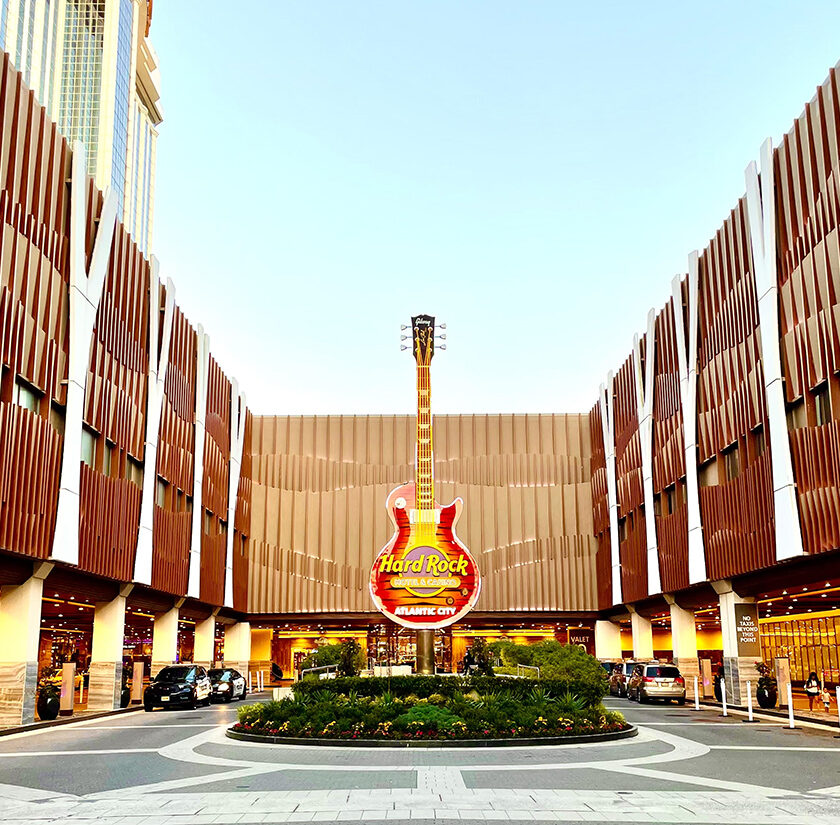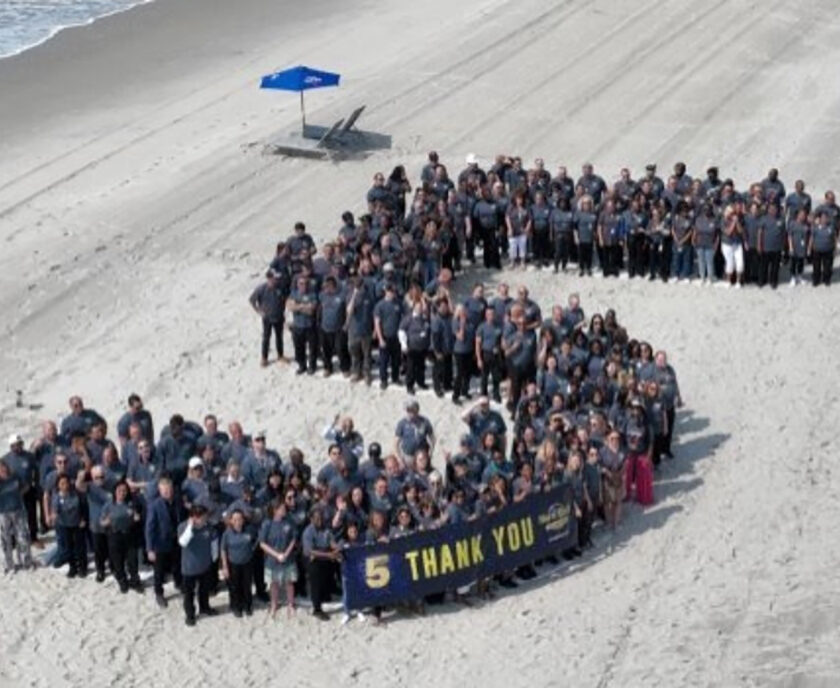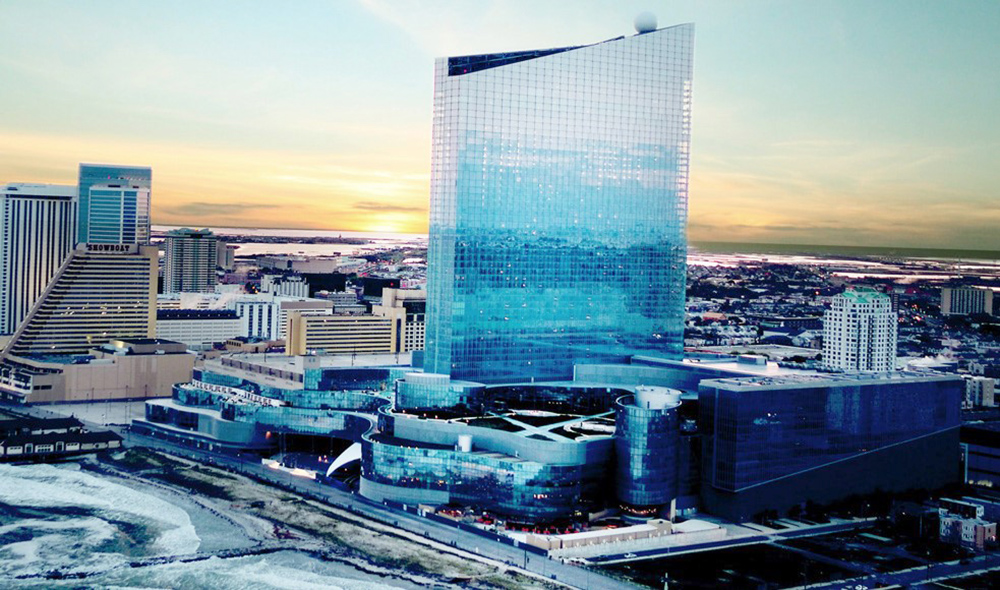By Chuck Darrow
June 28 marked a particularly significant milestone in Atlantic City’s legal-gaming era. That’s the day both Hard Rock Hotel & Casino Atlantic City and Ocean Casino-Resort celebrate their fifth anniversaries.
That two casinos would arrive at such an important date simultaneously is certainly noteworthy. But their back stories and current positions in the local gambling realm make the shared birthdays all the more significant, for both properties rose from the wreckage of failed operations.
Hard Rock, of course, spent its first 26 years as Trump Taj Mahal Casino-Resort which, when it opened in April 1990, was the world’s largest, most glittering casino-hotel complex. But the junk-bond financing former President Donald Trump used to get it built all but guaranteed it could never be profitable: At one point, it was reported that the Taj’s debt service was $1.10 for every dollar borrowed.
Its October, 2016 demise under the aegis of billionaire investor Carl Ichan was caused by a combination of factors, including intense competition from Pennsylvania for regional gamblers’ business, and Ichan’s clear disinterest in trying to make the gaming hall a viable enterprise (the latter was also apparent at his other Boardwalk holding, Tropicana Atlantic City, which is now part of the Caesars Entertainment conglomerate).

But at least the Taj was, for much of its existence, a top-tier property—both in gross revenue and, especially, when it came to entertainment and special events—and an industry pacesetter for years.
However, five blocks away, where Ocean now stands, an entirely different tragedy played out.
When it debuted in April, 2012, what was then called Revel was hyped as the herald of a new epoch for Atlantic City’s lifeblood industry. Built for $2.4 billion—and opened two years late because of the 2008 recession—the vast (2.6 million square feet of public space), architecturally stunning pleasure dome was a horror-show of miscalculation and perplexing strategies from the day its (inconvenient-to-access-from-the-Boardwalk) doors opened to the public.
For starters, Revel came with price points significantly above anything that had come before it in Atlantic City. And its target audience was comprised primarily of affluent New Yorkers between the ages of 25 and 54 who presumably would relish the chance to gambol and gamble in such opulence. One slight problem: That market apparently didn’t exist—or if it did, its disinterest in Revel was extreme.
Adding to Revel’s miseries were financing issues that, like Taj Mahal’s, made it nearly impossible for it to make money, and a series of operational missteps that puzzled those within and outside the industry, among them:
*The absence of a players’ lounge and buffet (pre-pandemic, the latter was an absolute necessity for any gambling den; the former still is).
*A single-tier rewards-card program. This meant that a customer wagering $500 a hand at the blackjack or baccarat tables was comped at the same rate as one betting $5 per hand.
*A building-wide no-smoking policy.
As one long-time industry observer put it, “It was as if they used a manual to open Revel, and its title was, ‘How not to Open an Atlantic City Casino.’” Thus, its shuttering after just 29 months of operation surprised absolutely no one.
But that was then and this is now. As they celebrate their fifth birthdays, both Hard Rock and Ocean are thriving.
Hard Rock was led from its opening until August of last year by Joe Lupo, who for years had been instrumental in establishing and maintaining the status of the city’s “gold-standard” property claimed by Borgata Hotel Spa & Casino, where he was senior vice-president (today, he is running the show at Las Vegas’ landmark Mirage Hotel & Casino as it undergoes its transformation into a Hard Rock facility). Hard Rock also has an established powerhouse brand and long-successful marketing game plan based, of course, on its all-encompassing pop-music theme.
Hard Rock also had behind it from the jump the Seminole Tribe of Florida, which owns The Rock’s corporate parent, Hard Rock International, and strong local involvement: The parent company’s board chairman is Atlantic City native Jim Allen, and local businessmen Joe Jingoli and Jack Morris have ownership stakes. All three have made it known that because of their local ties, Hard Rock Atlantic City is more than just another business investment, but one that is important to them on a personal level.
As such, the casino-hotel has always been guaranteed whatever financial support is required, whether for the complete pre-opening renovation of literally every square inch of the property (to the tune of more than $500 million) to the $30 million Hard Rock President George Goldhoff says is being spent on entertainment bookings in 2023.

The return on investment has obviously materialized: Hard Rock consistently trails only Borgata in monthly gross revenues, and arguably has surpassed it as the leading local show-business venue in terms of both the quantity of shows and prestige of those performing.
Supportive ownership is also a key to the success in which Ocean is currently (pardon the pun) reveling, according to its general manager, Bill Callahan.
Ocean, which in 2023’s first quarter led the pack in the all-important metric of net profits, has had several proprietors since its 2018 debut. It’s currently owned equally by New York hedge fund Luxor Capital Group and Detroit’s Ilitch Holdings Inc., whose other properties include Little Caesars Pizza, Motor City Casino-Hotel and the Detroit Red Wings hockey team and Tigers baseball team.
“We said, ‘Look, these are the things we need to make this property successful and profitable,’ and they took a chance on us,” Callahan told BettorsInsider.com, a website that focuses on sports-betting analysis and advice.
“Now they see the vision. At first they, said, ‘We’ll give you this much to start out with, and we’ll see where we go.’ We started with the Cove [a high-end slots parlor]…and we started moving around the building and they started to see the immediate success.”
More to the point, he added, the owners saw that they “didn’t have to write checks; it’s all [being paid for] by our operating profits.”
Both casinos are marking their anniversaries in a myriad of ways, from giveaways and promotions, to the opening of new bars and retail outlets, to the June 30 North Beach fireworks display, which both are co-sponsoring along with several other entities including neighboring Resorts Casino-Hotel (for details, go to
www.hardrockhotelatlanticcity.com and www.theoceanac.com). And if there is anything resembling a sure bet in Atlantic City, it’s that both properties have a lot to celebrate.
Chuck Darrow is a veteran entertainment reporter who has been covering Atlantic City’s casino scene as long as there has been an Atlantic City casino scene.






